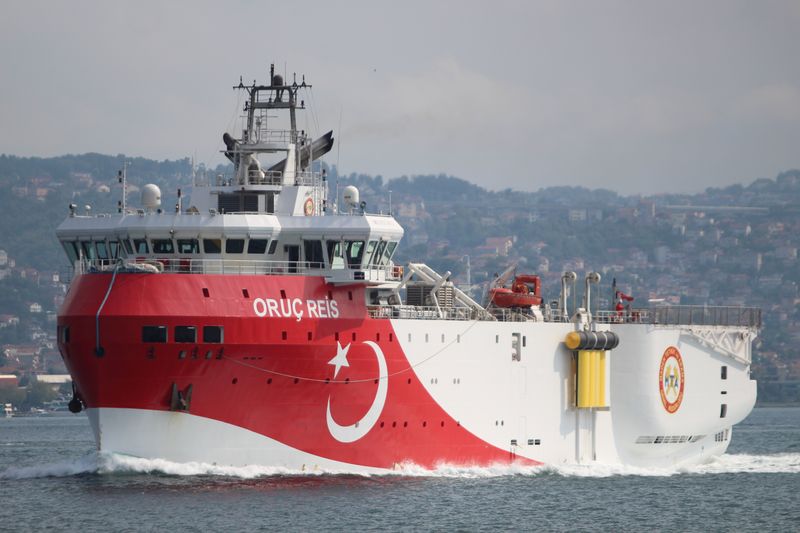ISTANBUL (Reuters) - Turkey's seismic research vessel Oruc Reis returned to waters near the southern province of Antalya on Sunday, Refinitiv data showed, a step that could ease tensions between Ankara and Athens over offshore natural resources.
NATO members Turkey and Greece have overlapping claims to continental shelves and rights to potential energy resources in the eastern Mediterranean. Tensions flared last month after Ankara sent Oruc Reis to map out possible oil and gas drilling prospects in waters claimed by Greece, Cyprus and Turkey.
Turkey's navy had issued an advisory earlier this month saying that the Oruc Reis would continue operations in the area until Sept. 12.
Foreign Minister Mevlut Cavusoglu had said the ship would continue exploratory operations for longer but no extension to the advisory was issued as of noon Sunday.
Refinitiv ship tracking data showed Oruc Reis, along with two accompanying vessels, had returned to a location just off the coast of Antalya on Sunday.
Turkey has repeatedly said it is open to solving issues with Greece through dialogue but had publicly rejected any pre-conditions, including Oruc Reis halting operations, ahead of negotiations.
"If there are those who set pre-conditions for Turkey, we have pre-conditions too and these pre-conditions need to be met," Cavusoglu said during a news conference on Saturday.
He did not elaborate and repeated that talks would ideally begin without pre-conditions.
Defence Minister Hulusi Akar, who was visiting Antalya's Kas district, near the Greek island of Kastellorizo, said on Sunday that Turkey was on the side of dialogue and a political solution.
"We have always done what is required by good neighbourly relations and we expect the same from the other side," he told reporters.
Turkey says it has a legitimate claim over the area in the eastern Mediterranean. There is no agreement between Greece and Turkey delimiting their continental shelves, while Turkey disputes any claims by Cyprus, with which it has no diplomatic relations.
Cyprus was split in a Turkish invasion in 1974 triggered by a brief Greek-inspired coup. Its internationally recognised Greek Cypriot government represents the whole island in the European Union, though its authority is effectively contained to the southern part. North Cyprus is an unrecognised Turkish Cypriot state recognised only by Ankara.

Seismic surveys are part of preparatory work for potential hydrocarbon exploration. Turkey has also been exploring for hydrocarbon resources in the Black Sea and discovered a 320 billion cubic metre (11.3 trillion cubic feet) gas field.